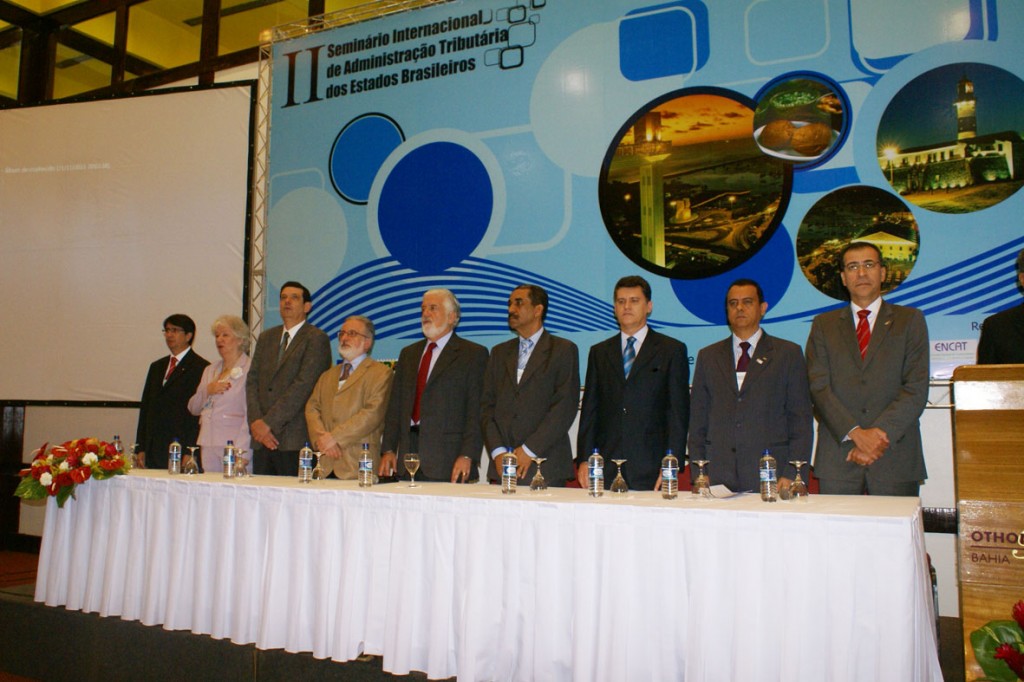International Seminar promotes exchange of experiences in the tax area
On the 21st and 22nd of November, the Second International Seminar on Tax Administration of Brazilian States took place in Salvador, Bahia, which brought together some of the main world authorities on the subject, with the aim of sharing information and discussing relevant aspects of tax management. Organized by the Government of Bahia, through the State Finance Secretariat (SEFAZ-BA), together with the Inter-American Center for Tax Administration (CIAT) and the National Meeting of State Tax Coordinators and Administrators (ENCAT), the event counted, on the first day, with the presence of the State Governor, Jaques Wagner.
In his opening speech, the governor highlighted the participation of institutions that represent organized civil society and stated that the collection of taxes should serve for the State to fulfill its role and promote social justice. “May we increasingly be able to create mechanisms that provide efficiency in tax management, always in a transparent manner,” said Wagner.
For two days, debates and lectures were held - among them that of ETCO's chief executive, Roberto Abdenur - with a focus on promoting transparency and improving the tax control system of participating states and countries. Also present were the Secretary of Finance of Bahia, Carlos Martins, and the coordinator of the Inter-American Center for Tax Administration (CIAT), Marcio Verdi. For Martins, the integration between state and municipal entities and also some international organizations is essential for the modernization of tax administration. "Among the challenges for the coming years is the discussion on electronic commerce, the so-called computer in the clouds, a practice that does not yet have legislation," he recalled.
The inaugural conference had as its theme the “Challenges of Modern Tax Administration”. With moderation by Martins, the CIAT coordinator, Marcio Verdi, showed the numerous challenges in the area of human resources and also the difficulties in charging the taxpayer. According to Verdi, to overcome these challenges, the key words are effectiveness and efficiency. “It is necessary to be effective not only in the collection, but in fulfilling the payments. The potential must be measured according to the fulfillment of the collection goal for budgetary purposes ”, he said.
During the second table of the event, Verdi became moderator of the exhibitions of the Director of the Institute of Tax Studies (IEF) of Spain, José Maria Labeaga, and of the Director of the Center for Tax Studies Internal Revenue Service - SRI of Ecuador, Miguel Acosta , which dealt with the relationship between Social Cohesion and the Tax Administration.
Labeaga presented comparative tables between Brazil and Spain and raised the question: "what can be done with tax administrations?". For him, “tax agencies are needed that work well, that have good services”, a result obtained by opinion polls with taxpayers about the service offered by the Spanish public administration.
Ecuadorian Miguel Acosta, on the other hand, emphasized that the collection of taxes must take into account social inequalities. “We must make better use of the government's role. Ecuadorians see taxes as an obligation and not a solidarity contribution. We have developed actions such as the National Tax Culture Day to promote tax citizenship, ”he said.
Continuing with the exchange, during the afternoon there was the participation of the National Treasury Attorney (PGFN), Paulo Ricardo Cardoso, moderating the panel “The performance of the tax authorities in pursuit of potential collection”. The theme was explored in the views of the taxpayer, CIAT, academia and Brazilian states through lectures by ETCO's executive president, Roberto Abdenur; CIAT's manager, Raul Zambrano; the professor at the Lisbon Higher Accounting Institute, Vasco Branco; and the Secretary of Finance of Maranhão, Cláudio Trinchão.
The second day of activities was marked by discussions on transparency and control in the management of tax administrations. Starting the lectures, the general director of Taxes of Spain, José Maria Meseguer, told about the experience in Spanish tax management, emphasizing the importance of tax education since school and the continuous training of civil servants. Then, Fátima Cartaxo, from the Inter-American Development Bank (IDB), pointed out some measures that contribute to a more democratic tax management, decentralization and integration between the country's fiscal governance, through the exchange of information and the sharing of banks. technical data and solutions.
"The use of technology to simplify service, eliminating technical formalities and favoring closer ties with the citizen, using tools such as the ombudsman's office, is essential for transparent management for the benefit of society," said Zayda Manatta, assistant secretary of Revenue Federal of Brazil.
Ending the activities, the professor of the Getúlio Vargas Foundation, Isaías Coelho, affirmed that “the government of Bahia is going ahead in the question of the tax administration, taking a fundamental step in the path towards the progress, through the technological modernization”, concluded.




